Adelaide Film Festival: Week 2 Report

Alex is a 28 year-old West Australian who has a…
Welcome to the second and final week of covering the Adelaide Film Festival 2017. After my first brief week, the second was a lot more demanding, which included roughly watching 3 films a day, a loaded week which made the GU Film House cinema my second home. This week featured an interesting selection of Australian and International premieres, festival favourites and charming documentaries.
Thelma (Joachim Trier)
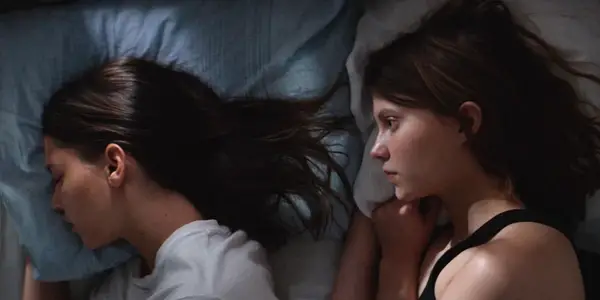
The best way to describe Joachim Trier’s Thelma is to put it bluntly: The Hallucinatory Lesbian version of Raw. Julia Ducournau’s Raw, the coming-of-age cannibal horror film that came out earlier this year (and one of my personal favourites of 2017 so far) shares some substantial similarities with Thelma, both being college-set female coming-of-age films that use genre touchstones to visually and metaphorically explore sexual awakenings and commanding authority over one’s own destiny. I’ll stop the comparisons there, as Thelma is great on its own terms, a disturbing but empowering supernatural drama that is bound to be beloved by genre fans worldwide.
After moving to university, Norwegian student Thelma (Eili Harboe) struggles to adjust to her new environment. Constantly under the thumb of her strict Catholic parents, Thelma struggles to make any friends, a problem which is compounded when she starts suffering from extreme seizures. After witnessing one of her seizures in a crowded library, Thelma meets fellow student Anja (Kaya Wilkins), becoming quick friends after a vigorous night out in the clubs. What starts off as an amusing friendship starts to slowly heat up, with subtle signs of growing affection bubbling up between the two young women. As Thelma’s feelings for Anja intensify, so do her mysterious seizures, which is one of the many weird events that start to surround her life, which include a constant flock of surrounding birds, intense visions of a suffocating snake, and strange appearances of Anja herself. As Thelma starts to investigate her strange new developments, long hidden revelations about her history and family lineage slowly come to light, secrets her parents had thought were long forgotten.
Whilst a major departure on a narrative level for Joachim Trier, Thelma contains many of the same thematic and technical aspects that are slowly becoming his trademark elements, including a heartbreaking observation that maybe Trier doesn’t have the greatest relationship with his dad. Much like his English language debut Louder With Bombs, Trier forgoes a traditional plot structure in order to finely draw the titular protagonist, developing her shifting physical and emotional state whilst subtly lacing in the paranormal aspects. These elements never feel silly or superfluous, but intelligently woven into the complex nature of Thelma’s maturation, one which is bound to be compared to the journey of Stephen King’s teenage psychic character Carrie.
Mayhem (Joe Lynch)
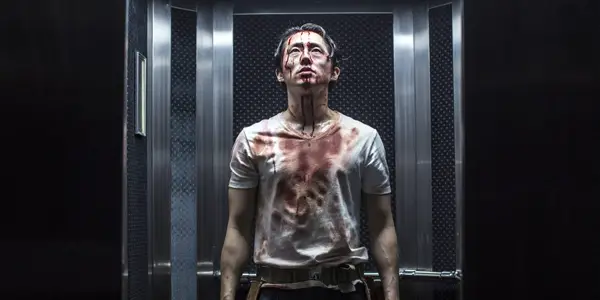
Mayhem is the cathartic release of cubicle chaos that The Belko Experiment should’ve been. Whilst The Belko Experiment merely took the aesthetics of the modern American workplace to tell a disconnected story of office workers shooting each other for survival, Joe Lynch’s corporate satire fully understands how to use the claustrophobic and overfamiliar setting to his advantage. Taking from his experience and background with cartoonishly gory horror films, Lynch has developed the template of the standard zombie film and infused it with a more action-orientated kick, a decision that makes his messages much more palpable and the various fight sequences much more fierce.
Derek Cho (Steve Yeun) is a man determined to succeed no matter what. Slowly climbing the complex and morally corrupt business of corporate law at TSC Consultants, Cho’s accession to the top is cut off when he’s planted as the fall guy for a failed case by a rival lawyer (Caroline Chikezie), an action that sees him immediately fired. As if his day couldn’t get any worse, the commanding building of TSC Consultants is contaminated by the ID7 Virus, a newly discovered contagion that unlocks the moral inhibitions within its hosts, effectively turning people into liberated citizens driven by lust, greed and rage.
With the office locked up by quarantine and 8 hours till a vaccine can be pumped into the building, Cho decides to take advantage of the situation by literally fighting his way to the top, resolved to get his job back from the top bosses who are huddled on the top floor. Teaming up with dismissed customer Melanie Cross (Samara Weaving), Cho must battle a legion of office rivals, using an array of hardware tools, office equipment and his own fists in order to rectify this crappy situation.
Lynch clearly understands the type of film this needs to be, efficiently setting up the key characters, location and premise right away, giving us enough details and understanding of the ‘rules’ of the world. This dynamic pacing means that he’s free to fill the film’s final hour with chaotic violence that makes for a quick and entertaining time, delivered by a video game-like structure, a surging streak of carnage that are all building towards a literal boss battle. Yeun and Weaving make for a terrific on-screen pair, gleefully embracing the film’s comedic tone whilst unafraid to take their fair share of brutal blows, understanding the Die Hard principle that the most relatable protagonists aren’t invincible to escalating damage.
Birdshot (Mikhail Red)
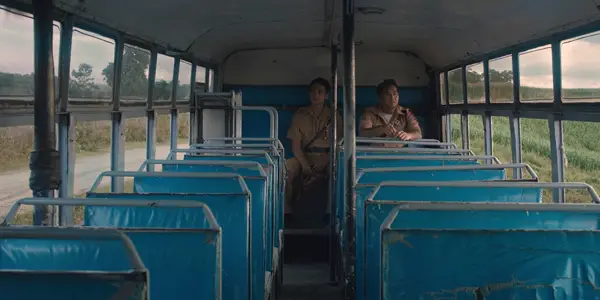
It’s that time of year again where we are privy to the best cinematic selections of all countries worldwide, as each country selects their single film to be put forth towards the Academy Award’s best foreign picture nomination list, a time which sees many of these potential award winners hit the festival circuit in hopes of achieving some hype and advanced chances of success. Birdshot is the Phillipines’ selection for next year’s Oscar ceremony, and whilst its a solid pick, I doubt it will escape the ranks of being a festival contender. A combined mixture of a female coming-of-age tale, police corruption thriller, and environmental conservational drama, Mikhail Red’s Birdshot is definitely an ambitious venture.
Wanting to make sure that his daughter can fend for herself, caretaker Diego Mariano (Ku Aquino) tries to teach her how to shoot a gun. After a failed lesson, 14-year-old Maya (Mary Joy Apostol) tries to rectify her reluctance to use the gun by going bird-hunting in the prohibited sanctuary that her father resides over. After she kills one of the endangered birds that lives within, the local police force are determined to find the culprit behind the illegal shooting of the bird. Rookie cop Domingo (Arnold Reyes) is paired up with Mendoza (John Arcilla), a violently corrupt cop who is trying to use the minor case to deflect Domingo’s attention away from an unsolved case of a missing bus of protesting farmers, one which may have connections to the dishonest police administration.
At a lengthy 2 hours, Birdshot is a slow burn that never fully justifies its extended run-time, especially with a first half that leisurely guides us through a series of predictable police procedural tropes. Seeing another film where a young, naive rookie policeman clashes with the corrupt, outdated systems of an older, wiser cop is a storytelling avenue that we’ve seen countless times before, and Mikhail Red’s script (co-written with his cousin Rae Red) fails to do anything new with that material. Maya’s coming-of-age journey isn’t as stereotypical, but is frequently overshadowed by Domingo’s dominant plot-line, which leaves her feeling underdeveloped and increasingly superfluous to the developing narrative. Mycko David’s cinematography looks great and every actor involved delivers a solid performance, but the straggling pace and clichéd characters constantly undercut this unique genre picture.
The Square (Ruben Östlund)

Without spoiling anything, I have to say that I’m quite surprised at the similarities I found between The Killing of a Sacred Deer (the festival favourite that I caught back at MIFF) and The Square, both black comedies that feature a privileged older white male whose life is torn apart by the vengeance of a young child. Where Yorgos Lanthimos delivered a pitch black comedic fairy tale in Sacred Deer, Ruben Östlund’s The Square is a much more goofier affair, an entertaining but episodic satire on the pretentious nature of the modern art industry.
The life of museum curator Christian (Claes Bang) is quickly shaken when on the way to work his wallet and phone are skilfully stolen by a pair of con artists. Determined to snatch back his taken possessions, he undergoes a risky venture, one which involves blackmailing an entire building’s worth of apartments, in order to discover the guilty culprits. This scheme distracts him from his daily work, which includes the installation of “The Square”, a new art piece which exists outside the entrance of the museum, a safe place where the kindness of strangers is tested. When the promotion of the exhibit escalates into some horrible PR, doubled with the results of his blackmail plan, Christian finds himself and his progressive worldview rightfully challenged for the first time.
The lack of conventional structure is the film’s biggest strength and weakness, as its spontaneity makes the unfolding mayhem unpredictable and frequently hilarious, but it too often diverts its attention to trivial subplots and clumsy political commentary. A whole story-line involving the romantic connection between Christian and American journalist Anne (Elisabeth Moss) constantly feels redundant and an unfortunate waste of Moss’ acting talents. The sharp jabs at the pretentious nature of the modern art industry are effective, and despite its arthouse sensibilities, the film is surprisingly crowd-pleasing (and mainstream audience friendly), with enough great sequences that pad out its overlong run-time.
In the Fade (Faith Atkin)
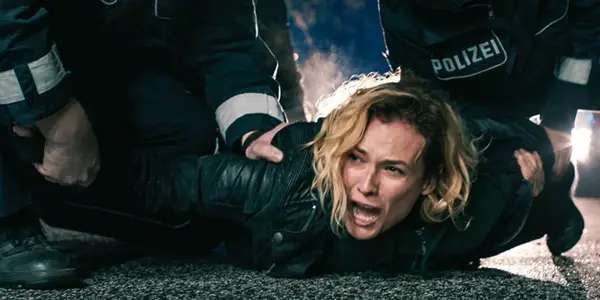
On paper, Faith Atkin’s latest drama, In the Fade, has all the elements to be an opportune film for this moment in political history. The story of a woman’s vengeance against neo-nazi’s is prime material to really explore today’s explosive atmosphere, but despite this, it surprisingly feels dated. The plot progression, the antagonists, even the main character herself all feel like something ripped from a mid-tier American ’90s thriller, something that would’ve had Kim Basinger in the lead role, delivered with a trashy title like “Female Vengeance”.
Unfolding in 3 distinct acts (titled Family, Justice and The Sea), Katja (Diane Kruger) leads a pretty happy life with her ex-drug dealing criminal turned accountant husband Nuri (Numan Acar) and their young son Rocco. Katja’s life is completely taken from her when a nail bomb is planted outside Nuri’s office, killing both him and Rocco. Emotionally distraught and left with nothing to live for, Katja becomes dependent on bringing justice on those responsible, who she suspects to be Nazis due to Nuri being a Kurd living in a German neighbourhood. When her estimation is proven correct, the racist couple responsible are brought to court, where a lack of dependable evidence sees them acquitted, an unjust verdict that forces Katja to get revenge herself.
The premise of a vigilante getting revenge on a criminal/criminals who have escaped legal punishment has been done a thousand times, so much so that it feels like its own sub-genre at this point. What In the Fade lacks is any form of subversion on this basic story; the plot is surprisingly straightforward and the Nazi’s are so cartoonishly one-dimensional and without motive that everything feels irritatingly monotonous. Diane Kruger does deliver an intense performance (in her first full German production), an agonising portrayal of a grief-stricken mother that’s much better than this material deserves. Remarkably formulaic and technically sufficient, In The Fade sternly guides its audience through a parade of misery in an attempt to be politically important, but instead just presents a series of echoed moments we’ve seen before.
The Florida Project (Sean Baker)
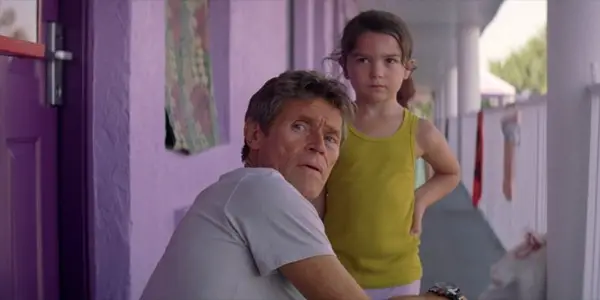
Coming off the success of the iPhone-shot drama Tangerine, Sean Baker has made his most accomplished film yet with The Florida Project, a funny and illuminating look at the effects of late stage capitalism, personified in a collection of poverty-stricken Americans surviving in Florida. Infused with the love for the often-disregarded members of society that drove many of John Waters’ subversive cult films, it’s obvious that Baker has a genuine appreciation for the mistreated subjects he focuses on, avoiding the typical feeling of exploitation or begging for awards attention.
Living week to week off a wage collected by selling budget perfumes to golf resort guests, ex-dancer Halley (Bria Vinai) tries her best to provide for her 6-year-old daughter Moonee (Brooklynn Prince). Using the “Magic Castle” budget motel as their makeshift home, Moonee spends her days killing time with some of the other unoccupied children who live at the motel, often causing trouble for Bobby (Willem DaFoe), the George Wilson to Moonee’s Dennis the Menace-like shenanigans. As Halley’s living situation grows worse, Moonee’s carefree world is on the verge of crumbling, which forces them both to make some life-changing decisions.
Instead of an iPhone 5S, Baker and cinematographer Alexis Zabe have shot The Florida Project in glorious 35MM film, a decision which makes for some of the best looking shots all year, helped out by some real creative choices and uses of some key Florida locations. The usage of film was inspired by the New Hollywood movement of the 1970s, where the integrity and naturalistic aesthetic helped boost the pragmatism of the subject matter. This technique is quite effective here, as the expressive and vibrant colours captured really render the child-like innocence that Moonee views her current dire situation, an interesting visual translation of her adorable naive perspective on life. DaFoe, one of America’s greatest living character actors, delivers another great performance here, alongside a hilarious cameo by Opie & Anthony regular guest Sandy Kane, who together share some hilarious moments. Spirited, passionate, but never cruel to its endearing characters, Sean Baker’s The Florida Project is definitely a film that’s going to be bounced around once major award nominations start dropping.
Newton (Amit Masurkar)
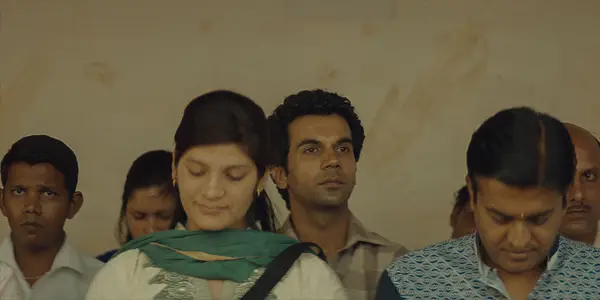
In today’s heated political climate, we’re bound to see a rise of films that reflect these growing tensions, stories that explore the complicated nature of society’s current issues. Comedian Patton Oswalt recently pointed out that we’re witnessing the first signs of ‘Trump-Era Cinema’, with the two titles he identified being Brawl in Cell Block 99 and The Florida Project, with the characteristics being dramas that feature protagonists whose only goal in the film is to simply get money to provide in their family, driven by financial desperation and a decaying economy. This growing discourse of politics is an international issue, which means that films from all over the world are bound to start making these politically-driven films, with an example of this being Amit Masurkar’s surprisingly cynical comedy Newton, which is India’s selection for the Best Foreign Picture nomination this year.
Newton (Rajkummar Rao), an optimistic government worker, feels unfulfilled in his current position as a reserve, someone who can only be deployed for work when another person cannot. He is delighted to finally get some proper work, to conduct the election within a conflict-ridden village in Central India that only has 67 citizens. Stuck dealing with a disinterested military captain who is happy to simply forge the votes, citizens who are too scared to vote and a growing fear of another guerilla attack from communist rebels, Newton is determined to keep a free and fair election within the dilapidated village.
Despite its cynical viewpoint on the state of politics in India, Newton is primarily a goofy comedy which never really rises above the level of ‘amusing’. The jokes and situations are frequently slight, with nothing ever inspiring hilarity or a consistent momentum of building chaos or escalating comedy. Each of the different characters, especially the titular protagonist, are all birthed from established narrative archetypes, and the material doesn’t give them enough definable characteristics to make them distinctive or truly memorable in any way. There’s a couple of interesting plot setups that are unfortunately discarded and wasted, which makes the strained pace feel laboured, as the film walks towards a predictable outcome. If Newton’s actual story reflected the skeptical tone that the script is trying to cover thematically, this could’ve been way more fascinating than it actually is.
Faces Places (JR & Agnes Varda)

Imagine if you took Steve Coogan and Rob Brydon’s road trip series The Trip and you replaced them with France’s most popular street artist and one of the icons of the French New Wave cinematic movement, and you’d have Faces Places. Agnes Varda, who alongside Jean-Luc Goddard, François Truffaut and Jacques Demy, was one of the prominent directors of the French New Wave movement of the 1970s, thanks to her focus on feminist issues, documentary experimentation and unconventional use of non-actors in her productions. Now at 88, she’s teamed up with JR, the popular but unidentified French street artist, whose innovative international art installations have made him a well-known figure within the modern photography world. In a destination-free journey along the French rural countryside, these 2 distinct artists decided to document everything they see and do, meeting a series of interesting people and places along the way.
In this eccentric but incredibly charming celebration of the power of art, Faces Places is infectiously powerful, a film which made me want to leave the cinema and immediately do something creative. Whilst some might dismiss the movie as simply an aimless expedition of France, both JR and Varda (who co-directed it together) use their photography skills to explore larger themes of friendship, the importance of collaboration and how we integrate memories in our art and daily lives. Despite a sharp focus on the art world, the film never feels pretentious or exclusionary; instead it welcomes all audiences to engage with the inventive portraits that the French pair paste around the different locations they visit.
Horror Movie: A Low Budget Nightmare (Gary Doust)
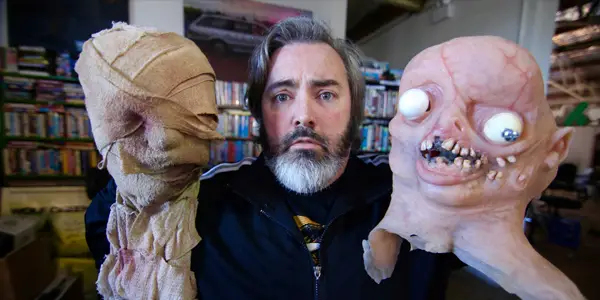
One of the universal truths about filmmaking is that it’s an incredibly hard and stressful venture, and realistically, we should applaud any film that manages to actually get made. Hundreds of variables are constantly present during every stage of production, with the potential for failure and disaster available at any unpredictable moment. This is especially compounded for independent cinema, where finances and resources are limited, but it’s a process that has birthed our greatest directors, those who are able to survive this process and make some impressive films. The legendary 1999 documentary American Movie serves as a definite examination into the hardships of making an independently financed micro-budget feature film, and now with Gary Doust’s Horror Movie: A Low Budget Nightmare, we have an updated, Australian take on the exhausting but ambitious nature of trying to make your own feature film.
Craig Anderson, Australian actor and producer (most well known as being the lead role in cult Australian TV series Double The Fist) decided to finally fulfil his life-long dream of making his own feature length horror film. Working off a script that took him 2 years to write, Doust documents the trials and tribulations of Anderson’s commitment to achieving this difficult undertaking. Problems that arise include obtaining the necessary finances, negotiating to get U.S. actor Dee Wallace to come to Australia and the typical amount of on-set dramas, as like with every film, nothing ever works out exactly as you have planned. Throughout the complicated journey, Anderson emotionally maneuvers through these different layers of complications with a level of bravery and conviction that’s incredibly inspiring.
Horror Movie never sugarcoats the making of Red Christmas, giving an honest and realistic portrait on the process of this Christmas-themed horror movie, one which deals with the tricky subject matter of abortions. The amount of filmmaking lessons and real-life applications of difficult decisions within the documentary makes it essential viewing for any amateur director/producer, not just the ones who want to make horror movies. The different people we meet, from Anderson to his family and extensive production crew, are all loveable subjects who make this material incredibly delightful and humanising, whilst the constant issues they face constantly keeps the audience engaged. Genuinely inspirational and consistently hilarious, Horror Movie: A Low Budget Nightmare is a charming but practical look at the absurd difficulties of making a feature film yourself.
Are you looking forward to any of these upcoming releases?
Does content like this matter to you?
Become a Member and support film journalism. Unlock access to all of Film Inquiry`s great articles. Join a community of like-minded readers who are passionate about cinema - get access to our private members Network, give back to independent filmmakers, and more.













